American 〇〇 is weird
American jokes
American dogs
Ame-kaji
"Never heard of these!" — by someone who grew up in America
Kevin’s English Room, known for often sharing interesting topics about America, has once again brought up a fun discussion I’d like to feature on Newgrounds. The topic is: “Are things labeled ‘American 〇〇’ in Japan actually American?”
In Japan, there are many products commonly referred to as “American 〇〇,” believed to originate from the United States. In this video, Kake (the blond man on the right, a beginner at English) and Yama (the airheaded guy on the left, with intermediate English skills) each bring examples of such items and ask Kevin (the guy in the center with glasses, born and raised in America) for his thoughts.
In this article, I will translate into English the Japanese content discussed in the video and add my own comments (by Precip.24) to each topic introduced.
1. American Dog (アメリカンドッグ)
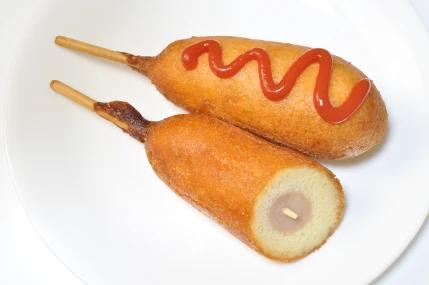
Yama: “There's no doubt about this one.”
Kake: “The American Dog is the most familiar ‘American’ thing we have.”
Yama: “Plus, you see it in America, and it exists there too.”
Kevin: “This is not American!”
Kake: “Huh?! But American Dog is American, right?”
Kevin: “That thing isn’t called ‘American Dog’ in America. It’s called a corn dog.”
Kake: “Same thing.”
Kevin: “I’d rather you not call it ‘American Dog’.”
Kake: “You’d rather we didn’t? LOL”
Kevin: “You guys should just call it corn dog.”
Kake: “Why not just keep it as it is? It fits America, and we saw it in America, so it’s an American Dog.”
Kevin: “That kind of careless naming really bothers me the most.”
Kake: “So it did bother you.”
Kevin: “I really want people to call it by its real name: corn dog.”
Kake: “So ‘corn dog’ is the real name.”
Kevin: “Exactly. And honestly, it’s not even something that represents America.”
Yama: “LOL”
Kake: “You’re mad about that too, huh?”
Kevin: “Yeah. There are way more foods that represent America better.”
Kake: “The corn dog is more like a side character.”
Kevin: “Yeah… It’s tasty, but it’s definitely not one of the foods that defines America.”
[Comment]
From my personal experience, ironically, the place where I see “American Dogs” the most is at Japan’s iconic summer festival, Natsumatsuri (夏祭り; a festival that honors ancestral spirits, kind of like a Japanese version of Halloween or Día de los Muertos). That famous image of anime characters in yukata watching fireworks comes from this festival.
That aside, I honestly think it’s the tastiest way to eat a sausage, aside from just putting it in a bun. The combination of ketchup and mustard is unbeatable, and for a while after getting hooked on that flavor, I started putting ketchup and mustard on almost everything I ate.
2. American Shorthair (アメリカンショートヘア, アメショー)
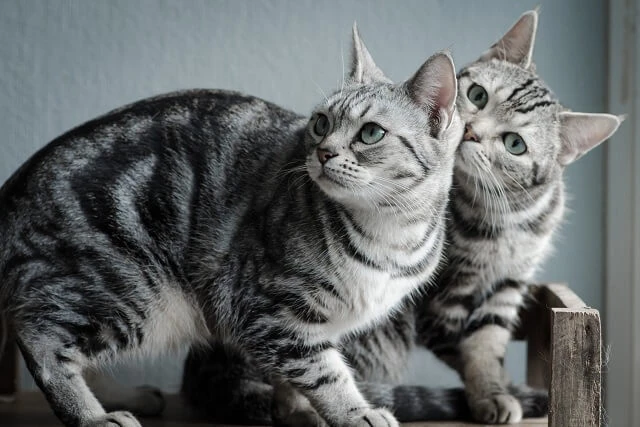
Kake: “Does that mean a short-haired cat from America?”
Yama: “It must be a breed that originated in America.”
Kevin: “Mind if I look this up real quick?”
Kake: “Go right ahead.”
(A few minutes later)
Kevin: “This one is American!”
Yama & Kake: “HOOO!”
Kevin: “Apparently, it’s even called ‘American Shorthair’ in America.”
Yama: “So they use the same name over there too.”
Kevin: “Looks like it.”
Yama: “I thought maybe Americans just called it ‘Shorthair’ or something.”
Kevin: “Seems like it’s a breed that’s specifically marketed as being bred within the U.S.”
Kake: “Huh, interesting.”
Kevin: “Its ancestors were cats from Europe, but the breed was developed independently in America, so they gave it the distinct name ‘American Shorthair’.”
Kake: “So it’s to distinguish it from other types of shorthairs.”
[Comment]
As Kevin mentioned, the American Shorthair is a breed with a history of being bred within the U.S. Interestingly, it was once called “Domestic Shorthair,” but that name had such a bad reputation that they eventually changed it to “American Shorthair.” Why exactly “Domestic Shorthair” was considered so unappealing… well, I’m not really sure.
Also, personally, I really like the American Curl — a breed known for its ears that curl outward. I’ve seen my own cat’s ears flop like that after sleeping in a weird position, but with the American Curl, they’re always like that, which is super cute!
There’s also a breed called the Scottish Fold, where the ears fold inward instead... sorry, I just really love cats. I could talk about them forever and never get bored.
3. The American Dream (アメリカンドリーム)
Kevin: “Okay, okay, okay, okay.”
Yama: “This is the very definition of ‘American,’ right?”
Kake: “Tons of people even go to America chasing this. If this doesn’t count as American, a lot of people’s dreams will be crushed.”
Yama: “I feel like I hear it a lot in movies too.”
Kevin: “This is American!”
Kake: “Yes!”
Kevin: “Even Americans say it all the time.”
Kake: “Really?”
Kevin: “‘The American Dream’ is used to mean that anyone has the chance to achieve great success. I guess it means the same in Japan too, but in America it carries that same idea.”
Kake: “It’s like the phrase was born from that culture or environment in America, where you can make a dramatic comeback in life.”
Kevin: “Exactly. A lot of immigrants come to the U.S. saying they’re chasing the American Dream.”
Kake: “I see.”
Kevin: “This one is definitely ‘American.’”
[Comment]
The American Dream… For me, it might be a little different from the motivations Kevin mentioned, like those of immigrants. I’m extremely socially anxious and live with constant loneliness, rarely interacting with others.
Even if 95% of that comes from my own personality, I sometimes wonder if the remaining 5% stems from the overly sanitized and hyper-systematized nature of Japanese society — a society where it’s entirely possible to go an entire day without speaking to anyone and still get by just fine.
For example, a friend once told me about how in America, just playing a mobile game at a bus stop was enough for a random old man next to him to ask what he was playing — people are that friendly.
And when I hear stories like that, I start to think it might be almost impossible to live in America without speaking to someone at all.
But at the same time, I also wonder if being in that kind of environment — even if the language barrier might be tough — could actually correct parts of my personality.
And that… is my American Dream.
4. American Coffee (アメリカンコーヒー)
Kake: “You often see ‘American Coffee’ on café menus.”
Yama: “Yeah, it's listed right there.”
Kake: “Blend coffee, American coffee, and… espresso or something like that.”
Kevin: “This one’s a tough call… but it is not American!”
Kake: “What?! No good? So it's not actually American coffee?”
Kevin: “You Japanese folks think ‘American coffee’ just means ‘weaker coffee,’ right?”
Yama: “Yeah, that’s the general image in cafés.”
Kevin: “And maybe you also imagine it's made with more lightly roasted beans, right?”
Kake: “Ahh, I see.”
Kevin: “Well, in America we do have a coffee called ‘Americano.’ I think that’s what you guys are referring to.”
Kake: “Yeah, I’ve heard of ‘Americano.’”
Kevin: “Right, Japan has Americanos too. That’s the one where you dilute espresso with hot water. But see, Japan has both Americano and American coffee. If the Japanese Americano is the same as the American Americano, then… what exactly is Japanese American coffee? If you're calling the kind of coffee Americans typically drink ‘American coffee,’ then that’s actually not accurate.”
Kake: “Ah, I get it now… So, what do Americans typically drink, then?”
Kevin: “If I had to say… just coffee.”
Kake & Yama: “LOL”
Kevin: “Black coffee.”
Kake: “I see, I see, got it. So it’s not light roast or watered-down — coffee is just coffee.”
Kevin: “Exactly!”
Yama: “And actually, Americano is usually made with dark roast, too.”
Kevin: “That’s right.”
Kake: “So then why is it called ‘American coffee’ here?”
(A few minutes later)
Yama: “According to what I found, apparently someone once saw an American actor chugging a big mug of coffee in an old movie, and they assumed, ‘It must be weak if he can drink that much at once.’ That’s how the term started.”
Kake: “Wait, what kind of reasoning is that?”
Kevin: “Then it’s even more unacceptable. I can’t allow something to be called ‘American’ based on that logic. Also, the reason that person could chug it like that was probably just because it was really sweet. Americans put tons of sugar and milk in their coffee.”
Yama: “So what if we call coffee loaded with sugar and milk ‘American coffee’?”
Kevin: “I’d be more okay with that. That at least makes some sense.”
[Comment]
There are people in America like L from Death Note! Well, that’s just a personal opinion, of course. Ultimately, the best coffee is the one you enjoy the most.
By the way, I only drink black coffee. (It’s funny how coffee with just sugar is still black in color, yet “black coffee” specifically refers to plain, unsweetened coffee!)
Interestingly, milk only started becoming common in Japan about 100 years ago, and there are even theories that the Japanese body isn’t naturally built to process it as a nutrient. As a Japanese person, my dislike of milk makes some sense — though in my case, it might just be due to a mental block that says, “Let bitter coffee stay bitter.” As proof of that, I prefer tea the more bitter it is, too.
Also, one tip for people visiting Japan: when you see the word “tea” (茶) here, it usually refers to non-sweetened tea by default. Just as bitter coffee is the norm in America, bitter tea is the standard in Japan. If you’re looking for the kind of tea that’s popular in the U.S. or U.K., you’ll need to ask for “koucha” (紅茶).
5. "American" (Pizza Menu Item)
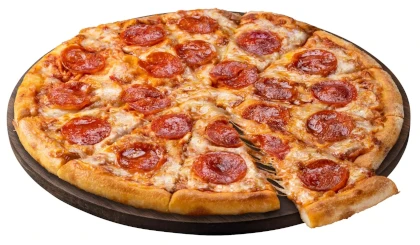
Kake: “On the Domino's Pizza menu, there's a pizza called ‘American,’ right?”
Yama: “What kind is that again?”
(A few minutes later)
Kevin: “Found it!”
Yama: “This one!”
Kake: “‘Pepperoni and tomato sauce’...”
Kevin: “Ohhh! This one! Yeah, this is ‘American.’”
Kake & Yama: “Nice!”
Kevin: “Calling this ‘American’ is a beautiful thing.”
Kake: “Beautiful? LOL”
Kevin: “It’s excellent.”
Kake: “Quite the opposite of the American corn dog situation.”
Kevin: “In America, the number one king of delivery pizza is the pepperoni pizza.”
Kake: “Really?”
Kevin: “It’s no exaggeration to say it’s the symbol of delivery pizza. So calling this one ‘American’ is totally acceptable.”
Yama: “Do Americans actually call this pizza ‘American’?”
Kevin: “Well, since it already has the name ‘pepperoni pizza,’ not really. You wouldn’t order it by saying ‘I’ll have the American,’ either.”
Kake: “Maybe the reason ‘pepperoni pizza’ isn't as well-known in Japan is because we just call it ‘American.’”
Kevin: “That could be.”
Kake: “That’s probably why we didn’t recognize the name ‘pepperoni pizza’ right away.”
Yama: “We always think of it as ‘salami.’”
Kevin: “LOL. That’s actually kind of a serious issue.”
Kake: “I always thought it was ‘karupasu’ (dry sausage snack)! LOL”
Kevin: “LOL, oh man, that is serious! Listen — this is ‘pepperoni pizza!’ If the name ‘American’ is overshadowing the proper name ‘pepperoni pizza,’ that’s kind of a problem.”
Yama & Kake: “LOL”
Kake: “But you’re okay with Japanese people calling it ‘American’?”
Kevin: “I think… that’s very ‘American’ of them.”
[Comment]
In my whole life, I’ve only once had a pizza topped with shrimp, crab, and scallops, all cooked in olive oil — it was so incredibly delicious that I’ve been quietly looking for that same flavor ever since, but haven’t found it again.
Also… pineapple pizza — I don’t see that much anymore either...
That said, if I were to draw a girl eating pizza right now, the first image that would come to mind would probably be pepperoni pizza. This might be a bit niche, but in Project Itoh’s novel Genocidal Organ, the protagonist was deeply in love with pizza — and I’d bet the kind he loved was pepperoni.
6. American Comics (アメコミ (amekomi))
Yama: “There’s Marvel and a bunch of others — those are ‘American comics,’ right?”
Kevin: “That’s right — they are American.”
Yama: “Oh, good to know!”
Kevin: “In America too, Japanese manga and anime have become pretty well-known. As their counterpart, terms like ‘comic books’ or ‘cartoons’ are used. There's a clear distinction in how we use them.”
Kake: “So they're not seen as the same thing?”
Kevin: “Exactly. So as an American, I can accept the logic of putting ‘American’ in front of something made in the U.S. We don’t usually call them ‘American comics’ ourselves — we just say ‘comic books’ — but if the idea is to recognize their unique identity, then I’d say it’s more or less acceptable.”
[Comment]
These days, there are more and more works that blur the lines between American and Japanese styles. For example, some works made in Japan have an American comic feel (like Panty & Stocking with Garterbelt), while others are made in the U.S. but look like they came straight out of Japan (like PUNCH PUNCH FOREVER!). Even when it's not that extreme, there are lots of works that incorporate elements of American cartoons or Japanese animation techniques in more subtle ways — and I think that kind of cultural exchange is really exciting and fun to see.
Also, I’ve come to realize lately that just because something is in English doesn’t necessarily mean it’s American. A good example of that is the game MiSide.
7. American Cars (アメ車 (Ame-sha))
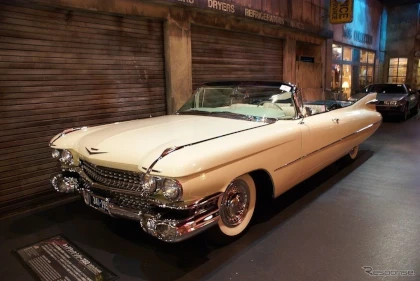
Kevin: “Somehow, they give off a kind of ‘classic car’ vibe, don’t they?”
Yama: “They’re definitely American cars, though. I’ve heard that real enthusiasts even go out of their way to import them from the U.S.”
Kevin: “But! These aren’t ‘American’!”
Kake: “Wait, what? But they’re American cars, right?”
Kevin: “You hardly even see cars like these in America anymore. These days, when you think ‘American-made cars,’ you think Tesla.”
Kake & Yama: LOL
Kevin: “I’m serious — Tesla all the way.”
Yama: “So modern American cars are Tesla now.”
Kevin: “Yeah, Teslas… and for some reason, also Toyota.”
Kake: “So American cars nowadays mean Tesla and Toyota? LOL”
Kevin: “That’s basically all you see on the streets — Teslas and Toyotas.”
Kake & Yama: LOL
Kevin: “Seeing a car like this, you wouldn’t think, ‘Oh, it’s so American!’”
Kake: “Too old-fashioned?”
Kevin: “Way too old. It’s ‘vintage.’ If you call it ‘vintage,’ then maybe it fits.”
Yama: “Ah, so it’s a vintage car.”
Kake: “Come to think of it, Japanese people don’t usually look at a Tesla and think, ‘That’s an American car!’”
Yama: “Yeah, it doesn’t feel like an American car.”
Kevin: “Still, calling these big, bulky cars ‘American cars’ isn’t totally wrong either.”
Kake: “Like Land Cruisers and stuff?”
Yama: “With smoked windows, blasting hip-hop.”
Kevin: LOL
[Comment]
You might already know this, but there's a Universal Studios in Japan, and inside USJ there’s a spot that looks like it was taken straight out of Pulp Fiction — the kind of retro restaurant scene you'd expect from the film. Parked there are lots of “American cars” — or more accurately, vintage cars — and I remember peeking inside and being fascinated by the bench-style seats that weren’t split down the middle, and old-school audio systems that I had no idea how to use. It all felt really charming.
Even though Kevin says what he does, games made in America like GTA still constantly feature these kinds of “American cars.” I imagine that’s why a lot of people develop a love for them in the first place.
8. American Football (アメリカンフットボール, アメフト)
Kevin: “This is definitely ‘American’!”
Kake: “Oooh!”
Kevin: “There’s nothing weird about calling it that. Even Americans say ‘American football.’”
Kake: “So that’s what it’s called even in the U.S.?”
Kevin: “Well, technically, a lot of people just say ‘football.’ But then again, there’s also the idea that football means soccer, right?”
Yama: “That’s not just an idea — that’s a fact.”
Kevin: LOL “There are definitely people like you in the U.S. too.”
Kake: “Ah, I see. The sports purists.”
Yama: “Think about it — it’s called foot and ball, right?”
Kake: “So there are people in the U.S. like Yama, huh?”
Yama: “I mean, it literally says foot and ball.”
Kevin: “...Yeah, and there are plenty of people in America who say that too.”
Yama: “It’s not that people like me exist — I’m the majority, aren’t I?”
Kevin: “...Which is why calling it ‘American football’ causes less conflict.”
Yama: “Exactly. That’s how the world should be.”
Kake: “Because of people like Yama.”
Kevin: “Exactly.”
Yama: “American football doesn’t even use feet that much!”
Kevin: “I get what you’re saying. The players mostly run around holding the ball.”
Yama: “I still can’t accept calling that ‘football’.”
Kake: “You're such a hardliner. LOL”
[Comment]
I really don’t know much about sports at all, but now that I think about it, I am starting to wonder why it’s even called that. …And wait, isn’t there another sport that’s similar to football? What was the difference again…?
By the way, in German, they do call soccer “Fußball,” which is basically the German version of “football.” And it’s kind of a classic moment for German learners when they first encounter that weird-looking letter “ß.” It’s like a rite of passage.
…Sorry, I don’t know nearly enough about sports to contribute anything more useful than that…
9. Ame-kaji (American Casual??)

(Examples of "Ame-kaji (アメカジ)" fashion)
Kake: “Does that mean ‘American casual’?”
Kevin: “It’s not American! Like... no one this fashionable exists in America!”
Kake & Yama: “LOL”
Yama: “Isn’t it just casual clothing in America?”
Kake: “Like wearing a leather jacket and all?”
Kevin: “American casual is more like this, right?”
Kake: “Don’t image search ‘Walmart customer‘! LOL”
Yama: “Stop that. Don’t look at Walmart customers like that.”
Kevin: “And the sizing is all wrong.”
Kake: “It looks like someone wearing a ridiculously long T-shirt and jeans... That’s the real ‘Ame-kaji.’”
Kevin: “There are some overlapping elements. Jeans with a T-shirt, or jeans with a hoodie—Americans wear those a lot... but Japanese ‘Ame-kaji’ as a genre is just too stylish.”
Kake: “So you're saying Japanese ‘Ame-kaji’ is holding onto some fantasy?”
Kevin: “Exactly. Way too fashionable.”
Yama: “Like rainbow-colored hoodies and bling.”
Kake: “And you have to wash them like 200 times before wearing them.”
Kevin & Yama: “LOL”
Kake: “Is the term ‘American casual’ even used in America?”
Kevin: “Nope. The phrase doesn’t even exist.”
Kake: “Then what is that stuff in Japan? What were people even looking at? Maybe fashion from old American magazines?”
Kevin: “It’s probably a genre based on something like, ‘This is what Hollywood stars would wear.’”
Yama: “There are stylish people in America, though, right?”
Kevin: “Yeah... a few.”
Yama: “LOL I guess the images of those people are what got imported to Japan.”
Kake: “So most people aren’t fashionable?”
Kevin: “They’re not fashionable!”
Kake: “So most people are Walmart customers.”
Kevin: “LOL Exactly. That’s the Walmart style.”
Kake: “Walmart casual.”
Yama & Kevin: “LOL”
[Comment]
Things like calling glasses “eyewear,” or introducing the concepts of “innerwear” and “outerwear”—the fashion world really has a tendency to invent new language constantly.
When I searched for the term “Ame-kaji,” I did find tons of images of Japanese people wearing clothes that do look like you might see them on the West Coast or East Coast of the U.S. LOL. Exactly—like wearing a jacket made of denim too, looking like they’re about to hop on a Harley-Davidson at any moment. That kind of fashion.
10. Sauce Américaine (アメリケーヌソース)
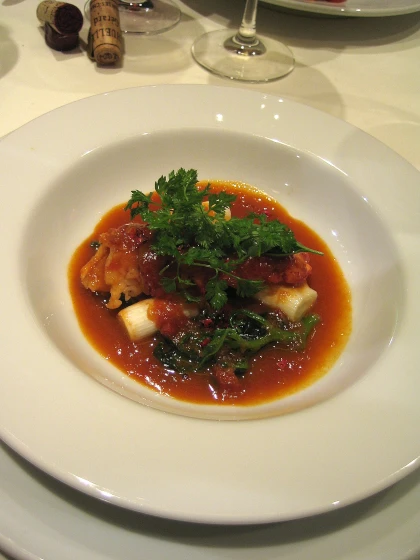
Kake: “What is sauce Américaine, anyway?”
Yama: “Apparently it’s that orange-colored sauce made from crushed shrimp shells and stuff.”
Kake: “And that’s what they call sauce Américaine?”
Yama: “Yeah, it seems like it’s a term from French cuisine.”
Kevin: “This is… uh, let’s just say they generously interpreted it as ‘American.’”
Kake: “‘Generously interpreted’?”
Kevin: “It’s a French word, right? As you can tell, America and Japan are fighting right now! ...Honestly, I don’t really get what’s going on with France.”
Yama: “LOL”
Kevin: “So even in France, there’s a flavor called ‘American’?”
Yama: “Apparently so.”
Kevin: “Technically, the phrase sauce Américaine exists in the U.S. too, so I guess calling it ‘American’ is okay... But the phrase ‘American Sauce’ doesn’t actually exist, which is kind of a problem.”
Kake: “So when you hear American Sauce, what’s the first thing that comes to mind?”
Kevin: “Barbecue sauce.”
Kake & Yama: “LOL”
Kake: “You’d never think it was this orange shrimp-shell sauce, right?”
Kevin: “Not at all. Also, ketchup and mustard—those might come to mind as ‘American sauce,’ too.”
Kake: “That makes sense.”
Kevin: “Honestly, this term feels like it could start a bar brawl, so I’d rather not comment on it too much.”
Kake: “LOL”
[Comment]
Oh! The classic combo of ketchup and mustard, perfect for an “American Dog” (or rather, corn dog), made its appearance! At least for Japanese people, that flavor pairing is deeply ingrained as the taste of “America.”
I'm originally from Kansai (western Japan), and the representative sauce of western Japan is Worcestershire sauce (yes... from England). If you order food in Osaka, chances are high that it’ll come slathered in this sauce—so if you’re planning a trip to Japan, you might want to prepare for that in advance.
There’s even this dish called omusoba (オムソバ)—noodles seasoned with Worcestershire sauce, wrapped in an omelet, then topped with ketchup and mustard. The result is a dish with no clear nationality, but to me, it’s the taste of home.
The sauces that represent different hometowns—now that would be a fun topic to research someday.
11. American Jokes (アメリカンジョーク)
Kake: “Japanese people might actually be the ones who use this the most.”
Yama: “You mean those jokes that aren’t really funny.”
Kake: “The kind that totally flop, but then someone goes, ‘That was an American joke,’ to cover it up.”
Kevin: “This is the least American of all!”
Kake & Yama: “LOL”
Kevin: “This is the one phrase I wish would go extinct!”
Kake & Yama: “LOL”
Kevin: “You heard it just now, right? Someone says something unfunny, then hides behind, ‘It was an American joke!’ The most frustrating thing is how that’s created this false belief that Americans have a culture of dodging with bad jokes like that.”
Kake: “So you’re saying there’s never been a time when a Japanese ‘American joke’ was actually an American joke?”
Kevin: “Never. Not even once. The comedy cultures are just completely different. In Japan, it’s all about setups and punchlines—‘boke and tsukkomi’—and storytelling with a twist at the end. In the U.S., the main style is stand-up comedy.”
Kake: “You mean the kind where they talk directly to the audience?”
Kevin: “Yeah, and there’s a lot of sarcastic back-and-forth. That’s what stand-up is. If people in Japan called that ‘American,’ I could understand. But they never use the term ‘American joke’ to describe that kind of humor.”
Kake: “Yeah, true. They really don’t.”
Kevin: “So, total rejection.”
Kake: “So ‘American joke’ never existed. What Japanese people are calling that is just ‘bad jokes,’ right?”
Kevin: “Exactly.”
Kake: “It’s like someone who’s obsessed with Western culture says something unfunny, and that’s it.”
Kevin: “And then they blame America for it! That’s the worst part!”
Kake: “Yeah, that’s kinda rough...”
Kevin: “Then people end up thinking, ‘American comedy must be super lame.’”
Kake: “Maybe that idea came from American comedy movies? Sometimes the translation makes things confusing.”
Kevin: “Like Full House and stuff.”
Kake: “Yeah, those shows don’t always come across well in translation. That might be part of it.”
Kevin: “And then there’s all that wordplay that only works in English.”
Kake: “So when it’s dubbed into Japanese, it ends up looking like people are laughing at moments that aren’t even funny.”
Yama: “There are also those riddle-style jokes, like, ‘Lincoln cut down a cherry tree, but his father forgave him. Why do you think that is?’”
Kevin: “Oh yeah, that kind of thing.”
Yama: “That might’ve shaped Japanese people’s image of ‘American jokes’ too, don’t you think?”
Kevin: “Stuff like knock-knock jokes—now those are definitely American.”
Kake: “But overall, it’s like the term got slapped onto jokes that don’t even deserve a name.”
Kevin: “And considering how it’s being used now, I say—rejected.”
[Comment]
One of the biggest side effects of learning English was that I lost the ability to purely enjoy content from that country. Whether it’s dubbed or subtitled, I start picking up on slightly off-sounding phrases and wonder what the original expression was, or what kind of linguistic acrobatics the translator had to perform to make it work. …And because of that, I’ve lost the innocent enjoyment I used to feel when English was still an unknown language to me.
Speaking of which—do you remember the joke Nick told the sloth in Zootopia? Did you find it funny? …Actually, never mind. Even as an English learner, I could understand almost 100% of what he said.
By the way, while they’re not quite at “American joke” level, I’ve always loved that quirky tone you find in American-authored textbooks. Like, in the Flight Simulator manual, there was a line that said:
“Now, the controller you’re talking to is hoping you’ll land your aircraft on the runway—not in the cornfield out front.”
I burst out laughing at that—and that style stuck with me. I feel like it’s influenced how I write articles like this now. That said, based on past experience… most people don’t really find my writing all that funny LOL Still, even if my sense of humor doesn’t land, I hope it at least comes across that I’m trying hard to entertain you.
And someday… I’d love to ask for a native writer who can craft “funny English” and create a brand new visual novel together.
12. Amerika-mura (A Shopping District in Osaka)
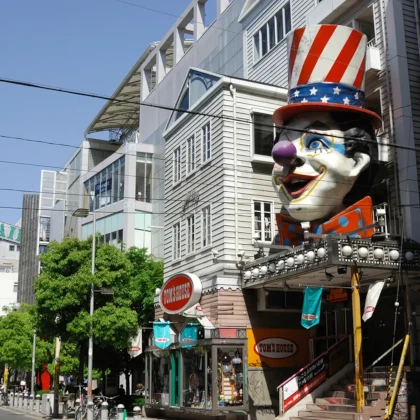
Kake: “Amerika-mura is basically the go-to hangout spot for Japanese people now.”
Kevin: “Rejected.”
Kake: “LOL”
Kevin: “On the contrary, could someone please explain to me what exactly is supposed to be ‘American’ about it? I came across this blog post recommending spots in the area, and the first thing it suggested was… takoyaki.”
Kake: “LOL”
Kevin: “Then came omelets. After that, katsu curry.”
Kake: “That’s all just yōshoku (Western-style food)!”
Kevin: “Next on the list—an ice dog?”
Kake: “Hey, see? There’s a ‘dog’ in there!”
Kevin: “There’s no such thing as an ice dog in America!! What even is an ice dog?!”
Kake & Yama: “LOL”
Kake: “Why is it called Amerika-mura in the first place?”
Yama: “Well, a lot of the vintage clothing shops there sell ‘Ame-kaji’ (American casual) wear, right?”
Kake: “Ahh, that’s probably it!”
Kevin: “Still rejected!”
Kake: “And sometimes you even see fake Mickeys walking around…”
Kevin: “At first glance, there’s absolutely nothing ‘American’ about it. Not a single thing about those pictures makes me feel even a hint of homesickness.”
Kake: “Well, it is a famous tourist spot. It’s definitely in the top five places to visit in Osaka.”
Kevin: “I mean, look—when we Americans make a Chinatown or a Little Tokyo, we try, right? We import real ingredients, we put in effort. Sure, it’s Americanized, but you were still able to get decent sushi in Little Tokyo, weren’t you?”
Kake: “Yeah… the sushi was pretty good.”
Kevin: “But Amerika-mura—like, what part of America is it based on? What inspiration did they even take from the U.S.? I seriously have no clue.”
Kake: “Honestly, if someone told me it was just a regular Japanese shopping street, I’d believe it.”
Yama: “I wonder how it ended up being called ‘Amerika’-mura in the first place…”
(A few minutes later)
Kake: “Apparently the clothes are actually imported from America… It says something about ‘West Coast culture.’ So I guess the theme is kind of the American West Coast?”
Kevin: “Maybe there’s a shop or two doing that?”
Kake: “You might be surprised—if you go, maybe it’ll feel nostalgic!”
Kevin: “...Yeah. I guess I can’t really say anything until I actually check it out for myself.”
Yama: “Let’s go buy a soft serve dog.”
Kevin: “I told you, we don’t sell stuff like that in America!”
[Comment]
I’ve never actually been to Amerika-mura myself. But the food definitely sounds appealing. And since it’s in Osaka, that probably means I’d get to enjoy that strange combo of flavors unique to the region—Worcestershire sauce (of British origin, no less) and demi-glace sauce, which has been rapidly gaining popularity recently.
I’m pretty sure that if you look for just five minutes, you’ll find omusoba, the aforementioned dish, and you’ll probably find “American dogs” (a.k.a. corn dogs). And after your meal, you can sit back and enjoy a nice cup of “American coffee”!
That concludes the content of this article. Thank you for reading all the way to the end. What did you think? In Japan, these kinds of things are recognized as “American Things.” I imagine there are people who share Kevin’s opinions on them, and others who feel the complete opposite.
When it comes to how Japanese people enjoy American culture by modifying it to suit Japanese tastes, there are some who feel a certain sense of guilt toward Americans. But at the same time, there’s also the recognition that this strange version of “America” that was born from such reinterpretations is, in a way, a distilled version of the America we admired since childhood—an idealized form of its charm, amplified (albeit somewhat misinterpreted) within Japanese cultural context. So even if it’s no longer “authentic,” the feeling remains that “this version of America is just so appealing—it can’t be helped.”
On the flip side, when we look at how Japan is portrayed in American works, there are plenty of expressions that remind us that, yes, America was once at war with Japan. But even with the weird depictions of “Japan” that show up in American movies, there’s a kind of affection—at least enough to be able to laugh at them as jokes.
Just like how I was shocked the first time I heard ZONE-tan’s “anime voice speaking English,” which inspired me to study English so much that I can now understand almost any English posted on Newgrounds, perhaps you too have a version of “Japan” you love most. And if that version has enriched your life in some way, then no one has the right to criticize you for it. I think the happiest path forward is to recognize that the opinions and critiques flying around in this video were all within the bounds of “American jokes,” and to continue living a rich and fulfilling life.
Creeperforce24
Yep, sounds pretty American!… except the American dream, that sounds like paradise to me
Precipitation24 (Updated )
Thank you!
Really? The 'American Dream' is one of the few examples Kevin has labeled as 'American'...
It seems like opinions on this topic really vary from person to person